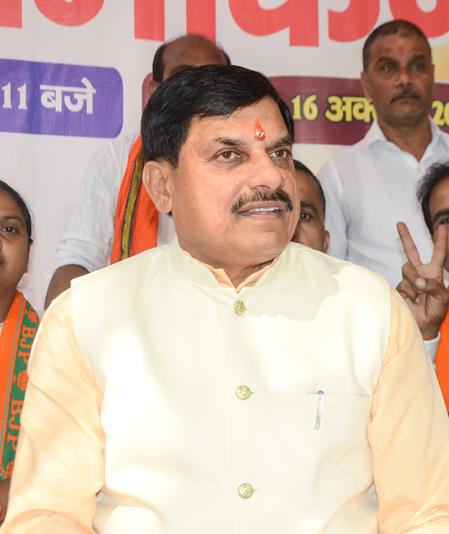
Madhya Pradesh CM Mohan Yadav To Host 'Kisan Sammelan' Tomorrow
The event will see the participation of nearly 2,500 farmers from several districts, including Narmadapuram, Bhopal, Sehore, Rajgarh, Raisen and Vidisha and some others.
During the meeting, Chief Minister Yadav will hold an interaction with farmers, and he will share information on the 'Bhavantar Scheme' to be rolled out on October 24. The scheme would benefit 0.6 million farmers in Madhya Pradesh.
The state government took this step to protect oilseed farmers against a fall in mandi prices. Under the scheme, the state government will compensate the farmers by paying the difference between the prevailing (lower) market price and the minimum support price (MSP) to farmers.
Under the scheme, farmers can sell their crops in mandis from October 24, 2025, to January 15, 2026. The Bhavantar amount will be directly transferred to the farmers' Aadhaar-linked bank accounts within 15 days.
This will be the second attempt by the Madhya Pradesh government to initiate the price deficit payment scheme (PDPS) or Bhavantar scheme aimed at ensuring that farmers get the MSP while the commodity is sold in the market as usual practice.
The soybean crop has been adversely impacted by excessive rainfall this monsoon season in the state, and there is fear that farmers may not get MSP in the mandis because of quality issues.
The state government had earlier launched Bhavantar Bhugtan Yojana in 2017 for eight crops, including soybean, groundnut and pulses, including pigeon peas, which the government decided to continue the scheme later.
Meanwhile, in a sweeping set of decisions aimed at bolstering agriculture, tribal livelihoods, and economic growth, the Madhya Pradesh Cabinet on October 14 approved key initiatives in a meeting chaired by Chief Minister Mohan Yadav.
At the forefront was the revival of the Bhavantar Bhugtan Yojana for soybean farmers, reintroduced after an eight-year hiatus following farmer demands for minimum support price (MSP) protection.
Madhya Pradesh, India's 'soybean bowl' producing nearly 60 per cent of the nation's output across 66 lakh hectares, has seen prices plummet due to oversupply and erratic weather, with many farmers fetching below the MSP of Rs 5,328 per quintal.
Under the scheme, the government will calculate an average mandi rate and compensate the price gap directly into farmers' accounts via DBT (direct benefit transfer).
Registration opened on October 3 and runs until October 17, with implementation from November 1 to January 31, 2026.

Legal Disclaimer:
MENAFN provides the
information “as is” without warranty of any kind. We do not accept
any responsibility or liability for the accuracy, content, images,
videos, licenses, completeness, legality, or reliability of the information
contained in this article. If you have any complaints or copyright
issues related to this article, kindly contact the provider above.
Most popular stories
Market Research
- Thinkmarkets Adds Synthetic Indices To Its Product Offering
- Ethereum Startup Agoralend Opens Fresh Fundraise After Oversubscribed $300,000 Round.
- KOR Closes Series B Funding To Accelerate Global Growth
- Wise Wolves Corporation Launches Unified Brand To Power The Next Era Of Cross-Border Finance
- Lombard And Story Partner To Revolutionize Creator Economy Via Bitcoin-Backed Infrastructure
- FBS AI Assistant Helps Traders Skip Market Noise And Focus On Strategy




















Comments
No comment